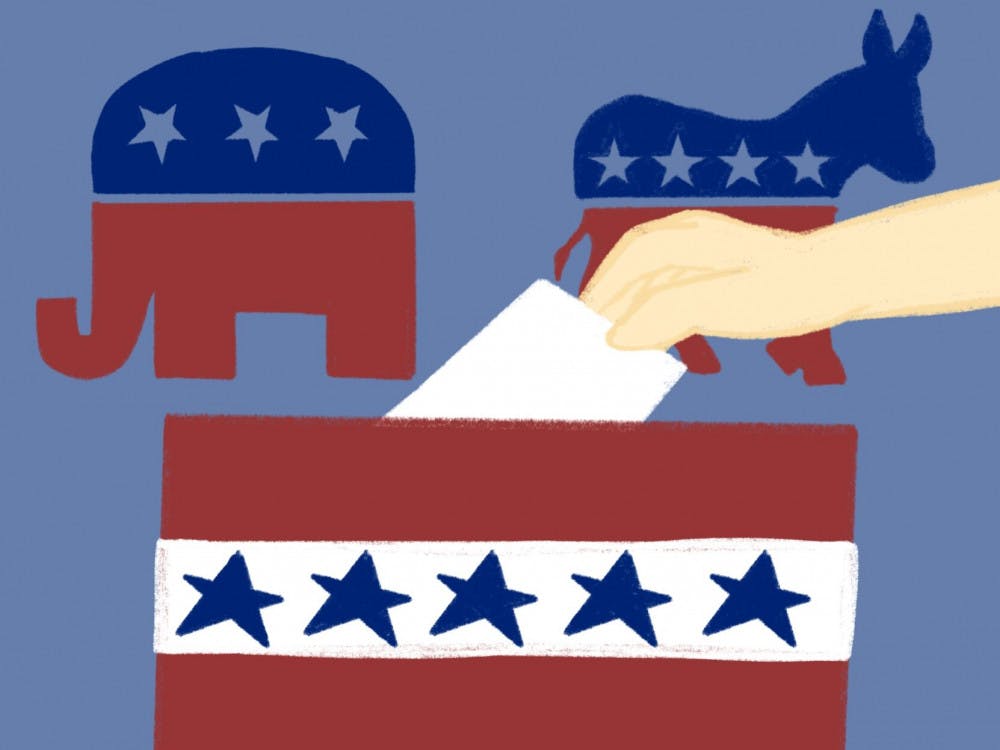
Almost a quarter of Alachua County’s nearly 187,000 registered voters cannot vote in primary elections.
A new amendment to Florida’s constitution might change that.
On Nov. 3, Florida voters will vote on Amendment 3, which proposes an open “top-two” primary election system.
The top-two system differs from a normal open primary, where parties still have separate ballots. In both systems, voters of any party affiliation can participate in the primary and vote for one candidate. Florida is one of nine states in the U.S. that holds completely closed state primary elections, meaning only voters registered to a political party can vote in that party’s primary election.
If the amendment passes, candidates from all parties would be on the same primary ballot, and the two with the most votes would face off in the general election. Only two other states, California and Washington, have a top-two open primary system.
Joshua Christopher, a 35-year-old registered Republican in Alachua County, said he only aligns with the party because of Florida’s closed primary system. He plans to vote in favor of Amendment 3. Christopher, who lives in northwest Gainesville, said sheriff elections are something he feels left out of because of closed primaries.
“As a conservative, or as a libertarian, I do not have a voice to vote who's going to be my sheriff,” he said. “I don't believe that's how the founding fathers wanted it.”
Democrat Clovis Watson Jr. won the party’s nomination to become Alachua County’s sheriff on Aug. 18. He became the presumptive winner when his only opponent, write-in candidate Robert Brinkman, withdrew from the race. The Republican party has not nominated a candidate for Alachua County sheriff in at least the last 20 years.
Christopher said if the amendment passed, he would likely change his registration to the Libertarian Party.
Chris Jones, the vice chair of the Alachua County Affiliate of the Libertarian Party of Florida, said the organization does not support the amendment. Non-party members should not be able to make decisions for private organizations, which political parties are, he said.
As a registered Libertarian, Jones could not vote in the Alachua County Democratic sheriff primary on Aug. 18. Despite not having a voice in the primary, he said open “top-two” primaries are not the answer.
“I don't think it's great that a large portion of population had no say in that election,” Jones said. “But at the same time that is what the opposing party's job is to do is put forth the candidate.”
The NAACP Florida State Conference and the League of Women Voters of Florida have come out against the amendment. In a statement, the league said it believed a top-two system would adversely affect Black candidates.
Both the Republican Party of Florida and the Florida Democratic Party have also come out publicly against the amendment, testifying to the Florida Supreme Court. Carol Weissert, a political science professor at Florida State University researching state politics, said the parties might be worried that opening their primaries to new voters could create unwanted results.
She said the amendment could change the number of registered non-party voters in the state, she said. More voters aged 19 to 29 tend to register as non-party-affiliated, Weissert said, and they may be more inclined not to vote in primaries because they would have to change their party affiliations to do so.
“That's the wrong signal to send to young voters,” Weissert said. “We want people to vote.”
An argument in favor of the amendment is that candidates will adjust their platforms to reach non-party affiliated voters, she said. However, in California, a state that adopted the proposed system in 2010, there is little evidence to show that the new system produced more moderate candidates out of primary elections, Weissert said.
Tom Wells, a former Democratic candidate for Florida’s 3rd Congressional District, disagrees.
Wells thinks non-party voter participation in primary elections would help to moderate extremes in the Democratic and Republican parties, specifically on issues like climate change.
“I am willing to vote for amendment three and take my chances, take our chances, take my grandchildren's chances on the fact that the [no party affiliation voters] will moderate both rather extreme positions,” Wells said.
Although Wells supports the amendment, he said it’s only a half-step. He said ranked-choice voting, where voters can rank candidates in order of preference, would be another step to ensuring everyone is represented. In Florida, the city of Sarasota approved ranked-choice voting in 2007 but has yet to implement it into elections. Maine is the only state in the U.S. with ranked-choice voting.
“The top two primary with ranked-choice voting is the ideal,” he said. “But right now, I am willing to go with passing and voting for open primaries and the top-two format”
The former congressional candidate said open-primary systems would force candidates to engage with people outside of their party and consider other points of view. Wells canvassed to voters with no-party affiliation for over a year before the Aug. 18 primary, he said.
Wells believes if the Aug. 18 primary election was an open “top-two” primary, the district could have seen two Democrats on the general election ballot. While the top two vote-getters in the Aug. 18 primary were Republican Kat Cammack and Democrat Adam Christensen, Wells said he thinks many no-party voters would have voted for either him, Philip Dodds or Adam Christensen.
“We need to let everybody have a decision in the primary as to what path of destruction we're going down,” Wells said. “Really fast, or slightly slower."
Steven Walker is the Fall 2021 Editor in Chief of The Alligator. He has previously worked at the Orlando Sentinel; and has bylines in the Miami Herald, Associated Press and Florida Times Union. In his free time, he likes to take long walks with his dog Luna and watch his favorite sports teams, the Orlando Magic and the Green Bay Packers.





